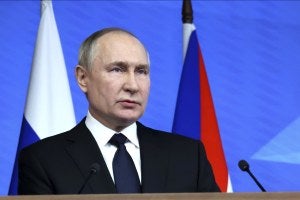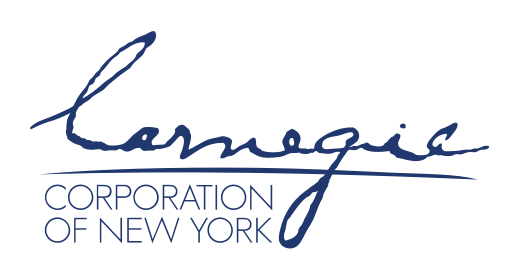The public shares the Kremlin's dim view of Western powers and wants to boost cooperation with BRICS members.
In the last decade, Russian President Vladimir Putin has pursued an aggressive foreign policy to restore Russia’s status as a global power. Joint surveys by the Chicago Council on Global Affairs and the Levada Analytical Center conducted between 2019 and 2023 have revealed some reservations among the Russian public about the high economic and diplomatic costs associated with his more aggressive policy choices. However, the most recent Chicago Council-Levada Center survey, fielded September 26–October 2, 2024, finds that Russians seem to think that the corresponding increase in global respect for Russia has been worth it.
Key Findings
- Six in 10 (62%) Russians believe it is best for Russia’s future if it takes an active part in world affairs, while a quarter (26%) believes it is best if Russia stays out of them.
- Russians are more likely to say military power (48%) has greater significance in determining Russia’s overall strength and influence in the world than economic power (39%).
- Maintaining Russia’s military superiority (85%) and strengthening cooperation with BRICS1 countries (83%) are seen by Russians as the most effective approaches to achieve Russia’s foreign policy goals.
- More than half of Russians (54%) say their country is now more competitive in the global economy than it was 10 years ago, but nearly two in 10 say it is either less competitive (19%) or equally as competitive (18%).
- Majorities of Russians believe their country should strengthen its relations with Belarus (79%), China (76%), India (67%), North Korea (64%), and, to a lesser extent, Syria (59%), and Iran (56%).
Russians Broadly Favor Playing an Active Role in World Affairs
Under Putin’s 20-year leadership, the Kremlin’s foreign policies have focused on restoring Russia’s influence in post-Soviet Eurasia, reestablishing the country’s international status, and countering both Western global dominance and encroachment on Russia’s sphere of influence. For their part, most Russians endorse their country’s involvement in world affairs: six in 10 (62%) believe it is best for Russia’s future if it plays an active role in the world, while a quarter (26%) believe it is better for it to stay out of global affairs.
There seems to be broad public support for Putin’s major foreign policy decisions, especially when it comes to the annexation of Crimea: In a 2023 Chicago Council-Levada Center survey, seven in 10 Russians (69%) said it brought more good than harm to Russia. Since the Levada Center started asking this question in 2015, majorities have perceived more benefit than harm from annexing Crimea.
Attitudes toward the more recent and ongoing “special military operation” in Ukraine are a bit more nuanced, as nearly half (47%) in the same survey said it caused more harm than good, while less than a third (28%) said it was more beneficial to Russia. A 2019 Chicago Council-Levada Center survey found nearly two-thirds of Russians (62%) said the Kremlin’s foreign policies had increased Moscow’s influence abroad. At the same time, majorities also said it had worsened relations with the United States (78%), Russian living standards (64%), and Russia’s economic situation (58%).
Despite this hesitation, about three in four Russians continue to support the actions of the Russian armed forces (76%) today and oppose making any territorial concessions for the sake of a ceasefire (71% oppose).
Moreover, Russia’s recent forays beyond its borders appear to have contributed to everyday Russians’ pride in their country. When last asked, in 2022, two-thirds (66%) said Russia is respected in the world (compared to one-third who said the same about the United States). Additional indicators of the public’s satisfaction: The majority continue to say Russia is moving in the right direction (67%, while 17% believe it is on the wrong track) and Putin’s approval rating in September–October 2024 is among his highest and marks a steady increase in public approval since Russia’s invasion of Ukraine in 2022.2
Military Strength Seen as Most Effective Foreign Policy Tool
The Kremlin places a high value on military superiority as a core component of Russia’s foreign policy, viewing it as essential for maintaining both regional and international influence. When it comes to determining Russia’s overall strength and influence in the world, the Russian public is more likely to say that military power (48%) has greater significance than economic power (39%). In 2019, eight in 10 Russians (83%) considered their country to be a rising military power and thought recent foreign policy decisions had improved the state of the Russian military forces (83%). Today, a large share say maintaining Russia’s military superiority is the most effective approach to achieve Russia’s foreign policy goals (85%).
While economic strength is judged to be the lesser force in determining their country’s overall influence, a majority of Russians say that compared to 10 years ago, their country’s economy is more competitive (54%, 19% less competitive, and 18% equally as competitive).
Russians Favor Strengthening Ties to BRICS Countries
To supplement Russia’s military superiority and play a more active role in world affairs, the Kremlin has engaged in greater multilateral cooperation over the last decade. Russia is now a key power in many international organizations, using its veto power in the United Nations; building a cadre of like-minded governments in the BRICS dialogues (including Brazil, Russia, India, China and South Africa, among others); and actively participating in the Eurasian Economic Union and the Shanghai Cooperation Organization.
While maintaining Russia’s military superiority is seen as the most effective foreign policy approach (85%), a large majority also consider their country’s participation in international agreements and organizations an effective approach to achieve Russia’s foreign policy goals (79%). They especially favor cooperation with the BRICS countries (83%).
Six in 10 Russians Express Negative View of United Nations
Although Putin has taken advantage of the status and opportunities provided by Russia’s seat in the United Nations Security Council to advance his foreign policy interests, Russia’s relations with the organization have been strained since the annexation of Crimea in 2014 and—even more so—since the ongoing war in Ukraine. The United Nations General Assembly adopted a resolution in the immediate aftermath of Russia’s invasion of Ukraine in 2022 that affirmed the international community’s commitment to Ukraine’s sovereignty, independence, and territorial integrity, and demanded that Moscow withdraw all Russian forces from Ukrainian territory.
For their part, nearly six in 10 Russians (58%) express a negative opinion of the institution (up from 34% in 2015) and more than half (55%) believe it either plays a minor role (26%) or virtually no role (29%) in the modern world. Still, a small share of Russians feels positively about the United Nations (19%, down from 34% in 2015) and believe it plays at least a somewhat important role in the modern world (30%).
Elaborating on their negative views, three in 10 (31%) Russians say “the United Nations is a useless organization,” while smaller shares say the institution either “acts against Russia” (16%) or is “a pro-Western organization acting like an American puppet (12%).”
Russians Feel Warmly Toward Countries Outside the West’s Orbit
The public’s more negative outlook toward the United Nations and more positive view of BRICS cooperation likely reflects Putin’s broader alignment with countries that have also been sanctioned and ostracized by the West, like China and Iran. The Kremlin began to look East and develop stronger ties with China, India, and other Southeast Asian countries after Russia annexed Crimea in 2014 and its relations with the United States and Europe deteriorated as a result.
Russians feel most warmly toward countries that are also experiencing tense relations with the West, including China (81% favorable), North Korea (64%) and Iran (50%). They are also more positive toward Brazil (55%) and Turkey (52%), countries that generally refrain from involving themselves in the competition between the United States, Russia, and China.
China, in particular, has provided an economic lifeline to Russia in the face of Western sanctions, and most recently, North Korea has deployed troops to support the Kremlin’s conflict in Ukraine. These data show that the Russian population is supportive of this eastward pivot: At least two-thirds of Russians say their country should strengthen its relations with China (76%), India (67%), and North Korea (64%). They are only slightly less supportive of strengthening relations with Syria (59%), and Iran (56%). But of all the countries presented in this question, they most want to strengthen ties with Belarus (79%), a staunch ally of Russia.
Russians Express Frosty Views of Western Countries and Israel
By contrast, majorities of Russians view the United States (59%), France (55%), the European Union (56%), and Israel (51%)—a Western ally in the Middle East—more negatively. However, they save the most damning ratings for Ukraine (74% negative). Positive views of the United States, the European Union, and Ukraine dropped significantly after Russia’s annexation of Crimea in 2014, but slowly increased until the Putin invaded Ukraine in early 2022, at which point favorability dipped again and has since remained low.
Russians’ hostility toward Western nations is, in part, related to Western governments’ criticism of Russian foreign policy and the imposition of sanctions on Russia. Yet Russians remain defiant in the face of these punitive measures. The September 2024 results find that relatively few consider Russia’s isolation from Western countries to be a critical threat to Russian security (28%). Similarly, few Russians in the 2023 survey appeared to be personally affected by the sanctions (15%). Moreover, in 2016, Russians told interviewers that the goal of the economic sanctions placed on their country in response to the annexation of Crimea was to weaken Russia (74%) rather than to stop the fighting in the Donbas (6%) or to return Crimea to Ukraine (17%).
Russian fears of NATO are also a factor here. The Russian public has largely accepted their government’s narrative that the United States and NATO are the main sources of tension between Russia and Ukraine. A June 2024 Levada survey found that two-thirds of the public say the United States and NATO bear most of the responsibility for the “death and destruction” in Ukraine (65%); just 6 percent blame Russia and 11 percent Ukraine. Sixty-two percent in the same survey say they are very concerned about Western military aid to Ukraine. The joint Chicago Council-Levada September 2024 poll also found that a majority consider the presence of NATO in eastern Europe a critical threat to Russia (58%).
And finally, Russians seem to share Putin’s views on US hegemony and a need to counter US global overreach. The data show that while about half of Russians (53%) believe it is necessary to improve relations with the Western countries, twice as many Russians believe their country should try to limit US power and influence in the world (62%) as say their country should be open for cooperation with the United States (30%).
Conclusion
These September–October 2024 data reveal the Russian public’s continuing appreciation for Putin’s foreign policy endeavors. Everyday Russians approve of their country’s eastward ties with China, Iran, and North Korea and consider these relationships worthy of cultivation. Russians also share the Kremlin’s dim view of both US and Western global influence and sense of threat from NATO. And in the case of the current conflict in Ukraine, public support for—or at least tacit acceptance of—the Russian military operations has endured since the start of the campaign. Wrapped around this suite of attitudes is the population’s broader sense that Russia, not the United States, “is back” and getting the international respect it deserves.
- 1
Brazil, Russia, India and China founded the BRICS group in 2006, and South Africa joined in 2010. Since then it has expanded to include a group of nations that jointly represents nearly half the global population.
- 2
Although Putin’s domestic approval ratings have always been relatively high, they have tended to spike around military operations or other measures that position him as defending Russian values or countering US influence, like the annexation of Crimea in 2014, intervention in Syria in 2015, and invasion of Ukraine in 2022.
The Chicago Council-Levada Center survey was conducted September 26-October 2, 2024, among a representative sample of all Russian urban and rural residents. Levada Center interviewers conducted these personal interviews in respondents’ homes. The survey sample consisted of 1,606 people 18 or older in 137 municipalities of 50 regions of the Russian Federation.
The data set is weighted by gender, age, and level of education for each type of settlement (large cities, medium cities, small towns, villages) within each Federal district independently, in accordance with Rosstat data. The margin of error for the full sample is 3.4 percentage points at a 95 percent confidence interval.




Related Content
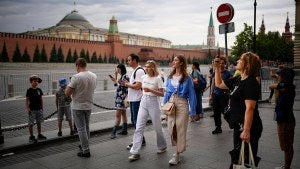 Public Opinion
Public Opinion
Russian young adults have a more positive economic and political outlook than their American counterparts, yet both youth populations think equally about emigrating.
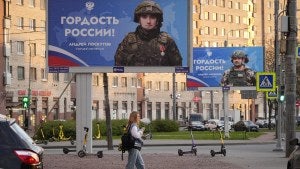 Defense and Security
Defense and Security
Although the public continues to support the military operation in Ukraine, a plurality say it has caused more harm than good for Russia.
 Public Opinion
Public Opinion
Although a plurality of young Russians say they are anxious about Russia’s political future, few vote or participate politically.
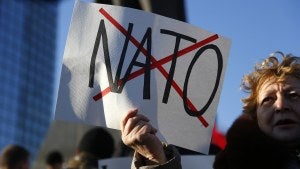 Public Opinion
Public Opinion
The Russian public is concerned about NATO expansion but does not think an attack from the West is imminent.
